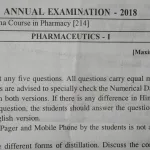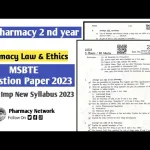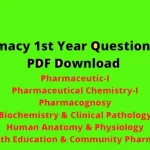Pharmacology is a vital subject in medical and healthcare education. Preparing for exams with previous year question papers helps in understanding core concepts and improving problem-solving skills. This compilation includes questions and answers from various subjects in pharmacology, offering a comprehensive study resource to aid students in exam preparation.
Pharmacology Previous Year Question Papers
General Pharmacology
Question What is pharmacokinetics?
Answer Pharmacokinetics is the study of drug absorption, distribution, metabolism, and excretion (ADME) in the body.
Question Define bioavailability in pharmacology.
Answer Bioavailability refers to the proportion of a drug that enters systemic circulation unchanged after administration.
Question What are the four primary drug targets in the body?
Answer The four primary drug targets are receptors, ion channels, enzymes, and carrier proteins.
Question Explain the first-pass effect.
Answer The first-pass effect is the metabolism of a drug in the liver before it reaches systemic circulation after oral administration.
Question What is a prodrug?
Answer A prodrug is an inactive form of a drug that becomes active after metabolic conversion in the body.
Question Differentiate between agonists and antagonists.
Answer Agonists bind to receptors and activate them, while antagonists bind to receptors but inhibit their activation.
Question What is therapeutic index?
Answer The therapeutic index is the ratio between the toxic dose and the therapeutic dose of a drug, indicating its safety margin.
Question Define drug tolerance.
Answer Drug tolerance is the reduced response to a drug after repeated use, necessitating a higher dose for the same effect.
Question What is the difference between potency and efficacy?
Answer Potency refers to the amount of drug required to produce an effect, while efficacy is the maximum effect a drug can achieve.
Question What are the phases of clinical trials?
Answer The phases of clinical trials are Phase I (safety), Phase II (efficacy and dosing), Phase III (confirmation), and Phase IV (post-marketing).
Question Explain pharmacodynamics.
Answer Pharmacodynamics studies the effects of drugs on the body and the mechanisms of their action.
Question What is drug half-life?
Answer Drug half-life is the time taken for the plasma concentration of a drug to reduce by half.
Question Define volume of distribution (Vd).
Answer Volume of distribution is a theoretical volume indicating how a drug is distributed in the body tissues compared to plasma.
Question What are the main routes of drug administration?
Answer The main routes of drug administration are oral, intravenous, intramuscular, subcutaneous, and topical.
Question What is enzyme induction?
Answer Enzyme induction increases the activity of drug-metabolizing enzymes, leading to reduced drug levels.
Question Explain the concept of bioequivalence.
Answer Bioequivalence means two drugs have similar bioavailability and produce the same therapeutic effect at the same dose.
Question What is idiosyncratic drug reaction?
Answer Idiosyncratic drug reaction is an unpredictable, rare reaction specific to an individual, not dose-dependent.
Question What are controlled drugs?
Answer Controlled drugs are substances regulated by law due to their potential for abuse or addiction.
Question Define drug-drug interaction.
Answer Drug-drug interaction occurs when the effect of one drug is altered by the presence of another drug.
Latest Posts
- Step-by-step guide to download and apply for jee mains admit card 202
- Comprehensive 2025 government holidays and recruitment details for job seekers
- JEE Mains Admit Card 2025: Your Step-by-Step Guide to Downloading the Hall Ticket
- Everything You Need to Know About 2025 Government Holidays Recruitment
- Comprehensive Guide to rrb d group recruitment 2025 – Eligibility, Vacancies, and Application
- Detailed guide to nps trust recruitment 2025 vacancies, eligibility and apply process
- Comprehensive guide to hpcl recruitment 2025 notification, vacancies, and application process
- ignou bed admission 2025 complete recruitment guide with eligibility and process
- Comprehensive Guide to Indian Army Agniveer Recruitment 2025 Notification and Jobs
- Everything You Must Know About CBSE Board Exams 2025 Changes & New Rules






